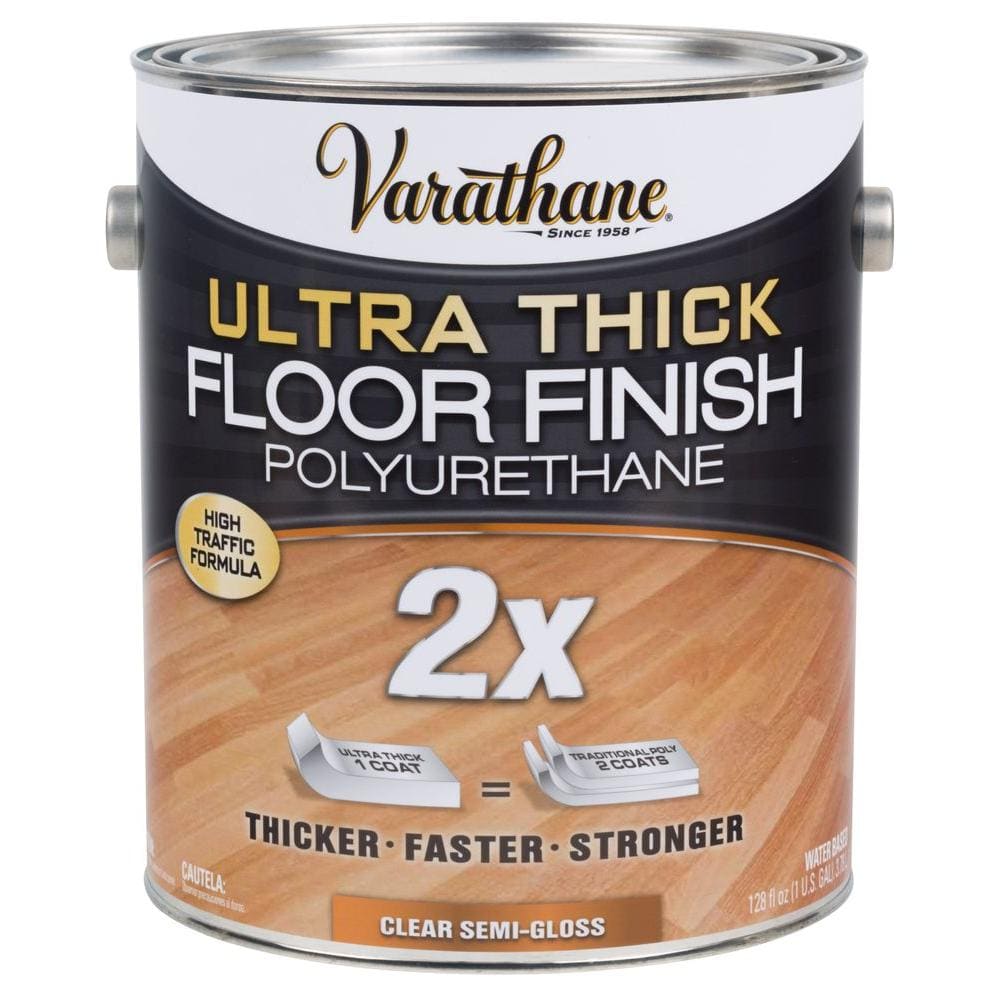Imagine this: You’re finally tackling that DIY floor project, excited to breathe new life into your old wooden floors. You’ve got the sandpaper, the stain, and the polyurethane… but then you see it – a whole range of polyurethane options, from “floor” to “general purpose.” You start to wonder, can I just use the “regular” polyurethane for my floors, or is there something special about “floor” polyurethane? The answer, as with many DIY projects, is a little nuanced.

Image: www.homedepot.com
While “regular” or “general purpose” polyurethane can work on floors in a pinch, it’s not the ideal choice. Understanding the differences between these types of polyurethane is crucial, as it impacts durability, finish, and even safety. Let’s dive into why floor polyurethane is often the better choice, and when it might be okay to consider a general-purpose option.
Understanding Polyurethane and Its Variations
Polyurethane is a durable, clear coating that protects surfaces from damage and adds a beautiful shine. It’s a popular choice for floors, furniture, and other wood surfaces. Polyurethane comes in various forms, each designed for specific applications and purposes.
The key difference between floor polyurethane and general-purpose polyurethane lies in their formulation and intended use. Floor polyurethane is specifically designed for heavy foot traffic, abrasion, and moisture exposure. This makes it the best choice for floors, especially in high-traffic areas like kitchens, hallways, and living rooms. General-purpose polyurethane, on the other hand, is designed for lighter-duty applications like furniture, crafts, and other surfaces. Here’s a breakdown of the key differences:
Floor Polyurethane
Durability: Floor polyurethane boasts exceptional durability thanks to its increased resistance to abrasion and impact. This is especially important for floors that endure heavy foot traffic and potential spills.
Finish: Floor polyurethane offers a range of finishes, from satin to gloss, to suit different aesthetic preferences. You can choose the level of shine that best matches your floor’s style.
Moisture Resistance: Floor polyurethane is formulated to resist moisture and water damage, a crucial feature for floors that are exposed to spills and cleaning products. This helps protect the wood from warping and damage.
Application: Floor polyurethane is specially designed for easy application to large surfaces, making it ideal for covering entire floors efficiently. It dries quickly, allowing for multiple coats to be applied efficiently.
General-Purpose Polyurethane
Durability: General-purpose polyurethane is less durable than floor polyurethane. While it’s still protective, it’s not designed to withstand the rigors of heavy foot traffic. It’s better suited for furniture and other items that experience less wear and tear.
Finish: General-purpose polyurethane typically offers a limited range of finishes, often with a slightly less durable shine than floor polyurethane.
Moisture Resistance: General-purpose polyurethane is less moisture-resistant than floor polyurethane. It may not be as effective in preventing water damage or staining on surfaces exposed to moisture.
Application: General-purpose polyurethane may be more challenging to apply to large surfaces, as it might not spread as easily as floor polyurethane.

Image: www.lowes.com
When to Use General-Purpose Polyurethane on Floors
While floor polyurethane is the ideal choice for most floor applications, there are a few situations where general-purpose polyurethane might be a viable option. For instance, in areas with very little foot traffic, like a guest room or an unfinished basement. If you’re only applying polyurethane to a small section of flooring, the cost difference might not be significant. Additionally, some general-purpose polyurethanes might be available in specialized finishes, like a matte or eggshell, which aren’t commonly available in floor polyurethane.
Tips and Expert Advice
Although you could technically use general-purpose polyurethane on floors, it’s always best to choose floor polyurethane for optimal results. Here are some expert tips for using polyurethane on floors:
- Thoroughly prepare the floor: Before applying polyurethane, ensure your floor is clean, dry, and sanded to achieve a smooth surface. This will create a strong bond between the polyurethane and the wood and ensure a professional finish.
- Apply thin coats: Apply thin, even coats of polyurethane, allowing each coat to dry thoroughly before applying the next. This will prevent the polyurethane from becoming thick and bubbly.
- Use a quality brush or roller: Utilize a high-quality brush or roller designed for polyurethane applications. Apply consistent pressure to ensure the polyurethane spreads evenly across the floor.
- Protect your work area: Ensure adequate ventilation, wear a mask and gloves, and cover any surrounding surfaces to prevent spills and accidental damage.
FAQs
Q: Can I use a general-purpose polyurethane for my floors if I add a sealer first?
A: While adding a sealer can enhance a general-purpose polyurethane’s durability somewhat, it won’t match the protection level of a dedicated floor polyurethane.
Q: Can I use general-purpose polyurethane on hardwood floors, but with a more durable finish?
A: It’s possible to find a general-purpose polyurethane with a high gloss finish, but for true durability, stick with a floor polyurethane formulated for heavy wear.
Q: Is it really worth the extra cost to use floor polyurethane?
A: The longevity and durability of floor polyurethane often make it the better value. It will withstand wear and tear longer, and you won’t need to reapply it as frequently.
Can You Use Regular Polyurethane On Floors
Conclusion
While a general-purpose polyurethane can be tempting for its lower cost, the durability and benefits of floor polyurethane make it the ideal choice for protecting your precious floors. With proper preparation, application, and maintenance, you can enjoy a beautiful, long-lasting finish on your floors for years to come.
Want to learn more about the best finishing options for different wood surfaces? Drop a comment below! We’d love to hear your thoughts and answer any questions.






